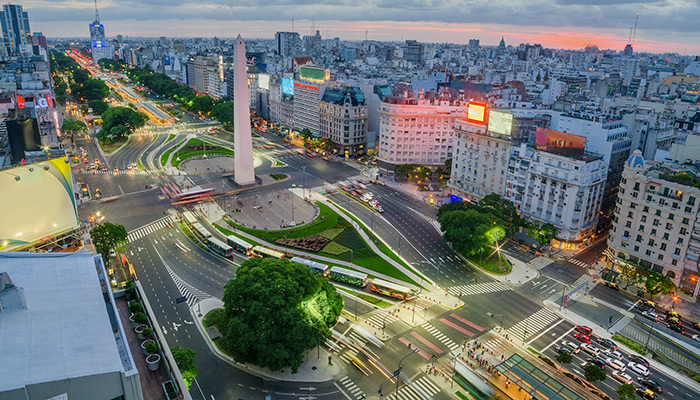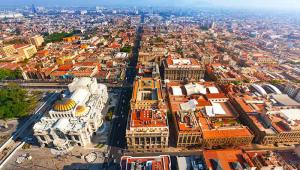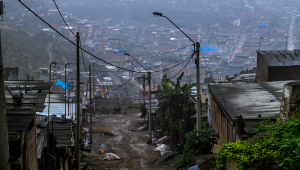After two years concocting a market-friendly reform recipe to great fanfare, Argentina’s president finds himself in the oven – with chips, as they say in Buenos Aires.
The idiom – a local version of being “up the creek without a paddle” – captures well the bad taste left by Mauricio Macri’s handling of the public finances.
That is because his decision to go cap in hand to the IMF for a $50bn lifeline to prop up his ailing economy is so psychologically nauseating for many Argentines it may ultimately prove to be the political equivalent of food poisoning.
The IMF’s board is expected to approve the rescue package this week and will require the Casa Rosada – Argentina’s pink equivalent of the White House – to undertake policies that will be hard for many citizens to swallow.
The standby credit line is a response to a crisis of confidence in the peso, whose value has plunged in the last year amid concern over a stubbornly high deficit and inflation.
The IMF has forecast a current account deficit of 4.4% of GDP in 2018, despite a government target of 3.2%, and Macri has struggled to rein in inflation hovering around 25%, hiking interest rates to 40% to limited effect.
Ignoring promises not to seek IMF help, the president has blamed his woes on changing global conditions – high oil prices and expectations that US interest rates will rise.
Things came to a head in April amid a sell-off of emerging currencies, hammering Argentina. As a result, the country’s growth prospects have been slashed to 1.3%.
But the conservative president’s real failure is timing. He left the oven on for too long while scribbling in the margins of his menu.
Macri came to power in late 2015 on an optimistic pro-business agenda promising to overturn years of protectionism and high public spending under leftwing Peronist presidents.
He floated the peso, scrapped export taxes, slashed subsidies to rein in a rising deficit and set borrowing targets. Crucially, he settled the blood feud waged by his predecessors with foreign creditors since 2001 when Argentina defaulted on its $100bn debt.
Macri’s calculation was that by getting tough on inflation and the deficit and cosying up to financial markets, investment would flood in – giving him breathing space to undertake deeper structural adjustment.
As a result, he put off key reforms to avoid instability after years of generous social spending under the Peronists – gambling that he would breeze to a second term in 2019 elections.
His caution was not unreasonable. Violent demonstrations over pension changes in December provided a taste of the resistance to cuts, and in February Macri blinked after unions threatened his labour reforms.
In the meantime, however, Argentina’s uncompetitive economy has been exacting a high price on investor patience – soaring debt, inflation and interest rates, and weakening exports.
Which makes the president’s pact with the IMF a gamble. In this part of the world, any pact with the Fund is a Faustian pact.
In a sign of things to come, just hours after Macri announced the decision on television angry demonstrators began protesting noisily outside Congress.
Argentines have long memories of a crippling recession between 1998-2001 and a subsequent meltdown that saw off four presidents in two weeks, left millions in poverty, took a decade to overcome – and was blamed squarely by political leaders on bad advice from the IMF.
Fund officials were accused of pressing a willing generation of politicians to embrace market policies that generated huge debts and a fathomless slump, the most disastrous of which was the “Convertibility Plan” that fixed the peso at parity with the US dollar in an effort to break with the country’s inflationary past.
Convertibility proved to be a straitjacket preventing policymakers from engineering recovery. Investors walked, and Argentina’s debt became unsustainable.
When in late 2001 the country was unable to meet its IMF obligations, the fund pulled the plug – unleashing the largest sovereign default in history and sparking Argentina’s worst crisis in memory.
After cleaning up the mess, Macri’s predecessors – Néstor Kirchner and then his wife Cristina Fernández de Kirchner – all but severed ties with the Fund in 2006.
The IMF has only grudgingly acknowledged its role in the collapse, insisting that its failure was not imposing stricter conditions on Argentina in the first place.
Macri has gone out of his way to patch up frayed ties, trumpeting policies cherished by Fund bigwigs such as central bank independence and public-private partnerships, and winning their warm words.
There is no doubt the IMF desperately wants him to succeed: its unexpectedly large $50bn credit line, double usual standby arrangements, sends an unequivocal signal that it has his back.
Everything will now depend on how conditions demanded by the IMF for its help affect ordinary Argentines.
Macri has pledged to accelerate efforts to eradicate the deficit by 2020 – a breathtakingly ambitious target – and his government is at pains to insist the IMF has exempted it from touching social programmes, magically ruling out austerity.
Which means the proof of Macri’s pudding will be in the eating.
Critics in Argentina are already saying the deal will have dire social consequences and unions have threatened to strike. Polls indicate that 75% of people oppose any deal with the IMF.
Furthermore, the president has precious little time to clock up results positive enough to convince voters that he deserves a second term.
While his governing coalition won a sweeping victory in October’s mid-term elections, the vote was a referendum on him personally – and since then Macri has burned the cakes.
Moreover, in next year’s general election Cristina Fernández – a trenchant critic of his agenda – is likely to make a comeback.
Despite a divisive reign, she is revered by millions of low-income Argentines for her generous spending, social liberalism, nationalisations – and uncompromising stance towards the IMF.















